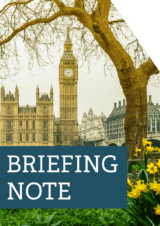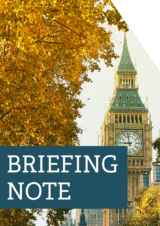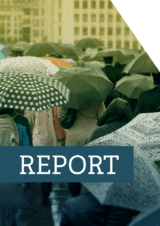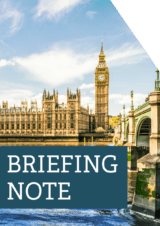Unsung Britain bears the brunt
This briefing note analyses the choices the Government has made in the context of an awkward backdrop to the 2025 Spring Statement.


This briefing note analyses the choices the Government has made in the context of an awkward backdrop to the 2025 Spring Statement.

Yesterday’s Green Paper marks a serious attempt by the Government to tackle two major concerns: the growing spend on disability benefits, and the large number of people who are not working through ill-health. [1] The proposals to tackle the former go much further than reforms suggested by the previous Government; between 800,000 and 1.2 million … Continued

Ahead of the Government’s Child Poverty Strategy, which promises to bring about “an enduring reduction in child poverty”, this report looks at what might be needed to achieve this welcome goal in the face of significant headwinds.

2025 will be a year with a bigger role for the state. Jeremy Hunt cut taxes in his last two Budgets and planned to pay for them with real-terms cuts to public spending in many areas. Rachel Reeves’s October Budget reversed these plans, pivoting to increasing spending on public services as a share of the … Continued

The Government is committed to releasing a child poverty strategy later this year. As part of this, Ministers will want to consider how best parental employment can help boost family incomes. But the mid-2020s present a different landscape for child poverty and parental employment from when the last Labour Government crafted its child poverty strategy. … Continued

Welcome to our final Housing Outlook of 2024.[1] This quarter, we turn our attention to those families with children whose housing costs push them below the poverty line. We start by noting 1.1 million children in the UK today live in a household whose income would not fall below the poverty line if housing costs … Continued

This has been the most anticipated Budget of modern times. It had to wrestle with profound – and sometimes conflicting – challenges: fixing the strained public services; repairing failing public services; and breaking with the UK’s dire record on public investment. And all of this had to be squared with pre-election pledges not to raise … Continued

The announcement that Winter Fuel Payments are to be restricted to recipients of Pension Credit or similar means-tested benefits has sparked controversy[1]. The Government and its defenders point to the lack of sense, in these straitened times, of making fuel payments to all pensioners when the majority do not need them. Opponents, however, highlight the … Continued

This is our sixth annual Living Standards Outlook. It provides an assessment of incomes, poverty and inequality as things stand in 2024-25, and projections up to 2029-30 using economic forecasts and policy assumptions inherited by the new Government. It also explores how three scenarios, based on an optimistic outcome for earnings growth and two illustrative … Continued

In this Spotlight we look at the impact of spending, tax and benefit decisions taken since 2010 through the lens of intergenerational fairness. What stands out in this context is the increase in the generosity of the State Pension, which has led to a £44 billion increase in spending, benefiting older age groups. By contrast, … Continued

Spending on social security as a share of GDP has risen slightly since the financial crisis, but the system in Great Britain has undergone profound change over the same time. Large-scale structural reforms have fundamentally altered the system’s rules for working-age families, while working-age benefits have been both cut back and then not fully indexed … Continued

The Conservative Party has announced that, if re-elected, it intends to increase the personal allowance for pensioners in line with the triple lock – a policy which has been referred to as ‘triple lock plus’, or the ‘quadruple lock’. We’ve had a look at the costs and impacts of such a policy, and how it … Continued

With neither of the main parties wanting to scrap Universal Credit, whoever wins the election will be governing a ‘Universal Credit Britain’, as the final stage of what has been the biggest benefit reform in a generation is due to end with a system covering 7 million families by 2029. But it is nearly 14 years … Continued

The beginning of April brings a new tax year, and a flurry of tax, benefit and pay policy changes coming into effect. Benefit levels are finally returning to their pre-pandemic levels after a difficult few years. Threshold freezes will continue to pull more people into paying tax, but the tax they pay on every extra … Continued

Tax-paying pensioners did not gain anything from the Chancellor’s Budget last week, and policies announced since 2019, including the six-year freeze to tax thresholds, will cut the incomes of pensioners by an average of £900 a year, with the largest losses felt by pensioners on the highest incomes. This has prompted accusations that the Government … Continued

In this briefing note, we put the decisions in the Spring Budget 2024 in context, discussing how the economic outlook has changed, what that means for the public finances, and how the policy decisions taken at the Budget will affect living standards in both the short and the medium term.

In this slide pack we preview the upcoming Budget, assessing the economic and fiscal outlook ahead of what will be a key pre-election economic-policy event. We focus on the scope for cutting taxes, and the implications of different policy choices, putting the Chancellor’s upcoming decisions in a broader context. We find that, despite near-term bad … Continued

In the 2023 Autumn Statement, the Chancellor announced that the Local Housing Allowance (LHA) will be re-pegged to the 30th percentile of local rents in April 2024. This will be the first increase to the LHA in four years, good news for the 1.3 million private renter households in receipt of Universal Credit or Housing … Continued

In this briefing note, we put the decisions in the 2023 Autumn Statement in context, discussing how the economic outlook has changed, what that means for the public finances, and how the policy decisions taken will affect living standards in both the short and the medium term.